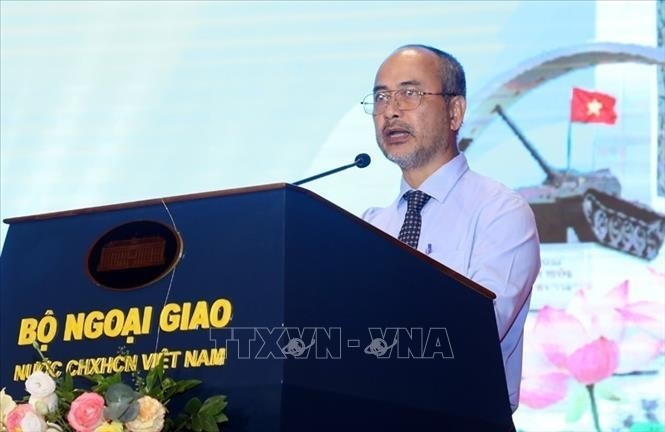Nguyen Trung Kien, Chairman of the State Commission for Overseas Vietnamese Affairs (SCOV) under the Ministry of Foreign Affairs, told the press that said the current term has seen evolution in OV affairs. What began as outreach and occasional mobilization has evolved into laws and mechanisms designed to let them take a more proactive and direct role in national development.
    |
 |
|
Nguyen Trung Kien, Chairman of the State Commission for Overseas Vietnamese Affairs (SCOVA) under the Ministry of Foreign Affairs |
The Party and State attach importance to supporting the material and spiritual needs of OV communities, with particular emphasis on preserving Vietnamese culture and language, supporting local integration, and fostering community unity. These efforts, Kien said, have bolstered their confidence, deepened their connections to the homeland, and encouraged greater contributions to Vietnam’s growth.
Following a Politburo’s conclusion issued in August 2021 and a Government’s subsequent resolution, agencies within the entire political system have innovated their working methods. Citizen protection and legal assistance have become more pro-active people-centered. Vietnamese language courses and cultural initiatives including the “Vietnamese Bookshelf” project, and community events have expanded in host countries. Engagement with OV experts, professionals and entrepreneurs has also intensified, especially in such priority fields as sci-tech, innovation, digital transformation, education, and healthcare.
Coordination involving ministries, localities and the SCOV has improved markedly. Numerous OV-led initiatives have been launched in Vietnam, while a growing number of Vietnamese scientists and professionals abroad are engaging in policy advisory roles, strategic consulting, innovation, startup mentoring and skilled workforce training.
On the draft political report, OV contributors broadly commended its quality and strategic vision, particularly the linkage between socio-economic development and Party building. Many welcomed a shift in leadership thinking as this is the first time four major reports have been merged into a single political report, complete with an attached action plan, a move signaling a commitment to “matching words with deeds.”
They also expressed broad support for the Congress’s theme, describing it as succinct, clear and reflective of national unity and development aspirations.
Regarding development strategy, he said feedback highlighted an emphasis on sci-tech, innovation and digital transformation as the three main pillars of Vietnam’s next growth model.
On foreign affairs and global integration, several comments spotlighted the nearly 6.5 million-strong Vietnamese community abroad as a strategic resource and soft power for global integration and people-to-people diplomacy. Suggestions included tighter coordination between diplomatic missions and mass organizations, the OVs’ leveraged role in cultural and scientific diplomacy, and expansion of “People’s Ambassadors” network to project an image of a creative, humane and globally engaged Vietnam.
For OVs-specific policies, contributors called for a stable legal framework to ensure their confidence in integration and contribution, expanded Vietnamese language education and cultural preservation, streamlined administrative procedures and digitized public services, increased youth exchanges, scholarships, and internships; and the creation of global networks connecting Vietnamese experts, entrepreneurs, and professionals with domestic localities.
According to Kien, OVs are closely following the upcoming Congress and place high expectations on its outcomes, believing that each decision will shape not only the country’s future and global standing but also the pride and identity of the global Vietnamese community.
Source: VNA